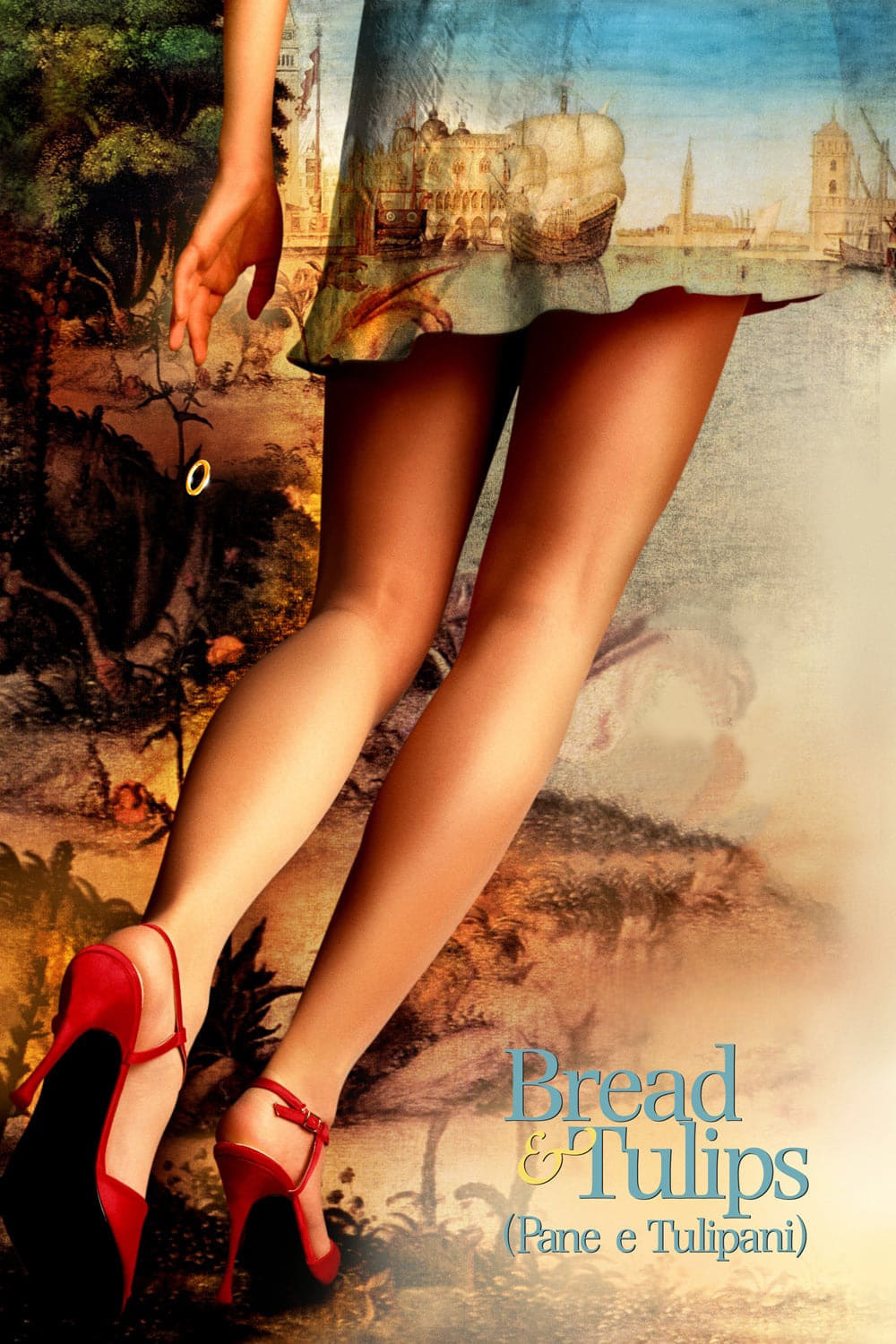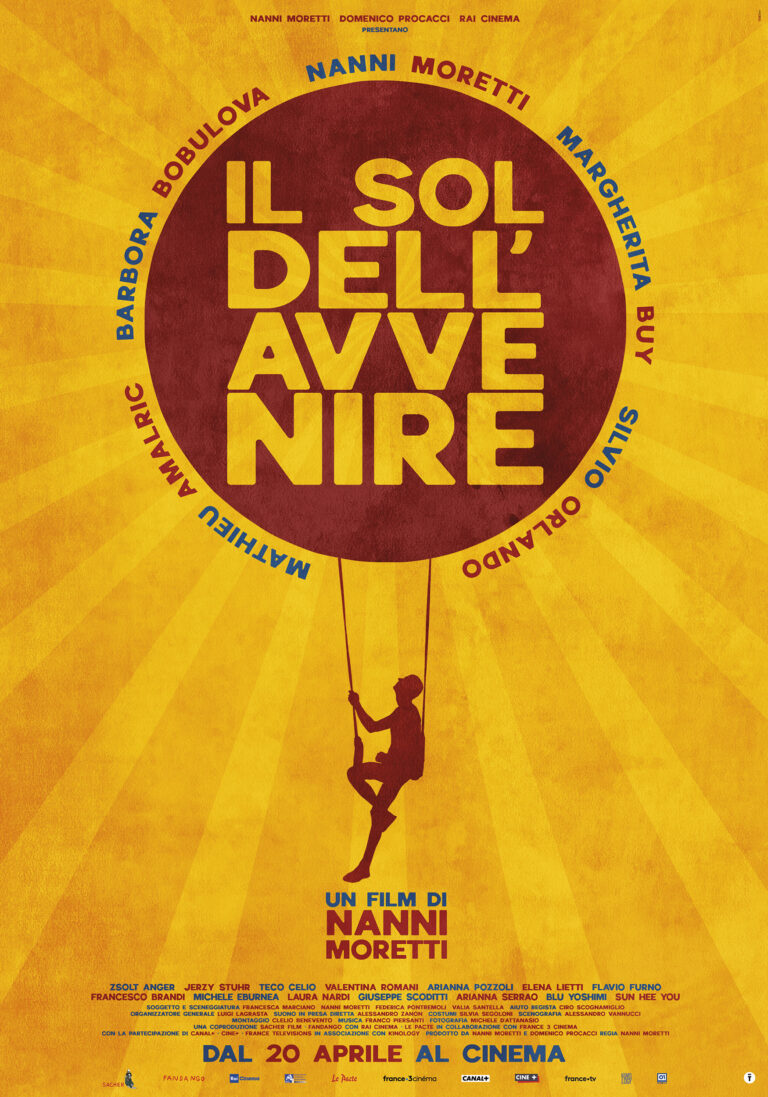
Bread and Tulips (Pane e Tulipani), directed by Silvio Soldini and released in 2000, is a charming Italian romantic comedy that has captured the hearts of audiences worldwide. The film tells a delightful and poignant story of self-discovery, independence, and the unexpected turns that life can take when one dares to follow their instincts. With a captivating performance by Licia Maglietta and a brilliant supporting cast, Bread and Tulips is a modern classic that combines humor, romance, and a touch of magic realism.
The Plot: A Serendipitous Journey
The story begins with Rosalba (Licia Maglietta), a middle-aged housewife from Pescara, who is on a family vacation with her husband and two teenage sons. During a chaotic stop at a rest area, Rosalba is accidentally left behind when the tour bus departs without her. Instead of waiting for her family to return, she decides to hitchhike her way home. However, a spontaneous impulse leads her to Venice, a city she has always dreamed of visiting.
In Venice, Rosalba finds herself charmed by the city’s beauty and decides to stay for a while. She rents a modest room from Fernando (Bruno Ganz), a reserved and kind-hearted Icelandic waiter with a poetic soul. As she immerses herself in the magic of Venice, Rosalba discovers a new sense of freedom and begins to rediscover her passions and identity.
Meanwhile, her husband Mimmo (Antonio Catania), a controlling and unimaginative man, becomes increasingly desperate to bring her back. He hires Constantino (Giuseppe Battiston), an amateur detective and plumbing supply salesman, to track her down. As Rosalba embraces her newfound independence, she forms meaningful connections with the eccentric and lovable characters she meets in Venice, including Fernando, her quirky neighbor Grazia (Marina Massironi), and a charming florist.
Themes of Bread and Tulips
Self-Discovery and Empowerment
At its core, Bread and Tulips is a story about self-discovery and empowerment. Rosalba’s journey represents the courage it takes to step away from societal expectations and rediscover one’s individuality. As a woman who has spent years devoted to her family, Rosalba’s unexpected detour to Venice allows her to reconnect with her own desires, talents, and dreams.
The Power of Serendipity
The film celebrates the beauty of serendipity—the idea that life’s most meaningful moments often arise from chance encounters and unplanned detours. Rosalba’s accidental separation from her family becomes a turning point, leading her to a new chapter filled with unexpected joy and self-fulfillment.
Venice as a Character
Venice itself plays a significant role in the film, serving as more than just a backdrop. The city’s romantic canals, historic architecture, and whimsical charm mirror Rosalba’s transformation. The film portrays Venice as a place where the ordinary becomes extraordinary, and where people can rediscover themselves amidst its timeless allure.
Connection and Belonging
Through her interactions with the people she meets in Venice, Rosalba experiences a sense of community and belonging that contrasts sharply with her life back home. The relationships she forms are genuine and heartfelt, underscoring the importance of human connection in personal growth.
Performances That Bring the Story to Life
The film’s success owes much to its exceptional cast, led by Licia Maglietta as Rosalba. Her nuanced performance captures the character’s quiet strength and vulnerability, making her journey both relatable and inspiring. Maglietta’s ability to convey a wide range of emotions with subtlety adds depth to Rosalba’s transformation.
Bruno Ganz delivers a memorable performance as Fernando, the soft-spoken and enigmatic waiter who becomes Rosalba’s confidant and potential love interest. His gentle demeanor and poetic sensibility make Fernando a compelling character, and his chemistry with Maglietta is understated yet deeply affecting.
The supporting cast, including Giuseppe Battiston as the bumbling yet endearing detective Constantino and Marina Massironi as the eccentric Grazia, adds humor and warmth to the narrative. Each character contributes to the film’s whimsical charm, making the world of Bread and Tulips feel vibrant and full of life.
Silvio Soldini’s Direction
Silvio Soldini’s direction is a masterclass in balancing humor, romance, and introspection. He approaches the story with a light touch, allowing the characters and their emotions to take center stage. The film’s pacing is deliberate, reflecting Rosalba’s gradual awakening and the leisurely rhythm of life in Venice.
Soldini also skillfully incorporates elements of magic realism, adding a dreamlike quality to the film without straying too far from reality. The whimsical tone enhances the story’s themes of transformation and serendipity, creating a world where the mundane becomes magical.
Cinematography and Music
Luca Bigazzi’s cinematography beautifully captures the essence of Venice, from its picturesque canals to its intimate alleyways. The city is bathed in soft, golden light, creating a warm and inviting atmosphere that mirrors Rosalba’s emotional journey.
The film’s score, composed by Giovanni Venosta, is equally enchanting. The music blends traditional Italian melodies with contemporary sounds, complementing the story’s blend of old-world charm and modern sensibilities. The score enhances the film’s emotional resonance, adding depth to its lighter and more introspective moments.
Legacy and Reception
Bread and Tulips was met with widespread acclaim upon its release, winning numerous awards, including several David di Donatello Awards (Italy’s equivalent of the Oscars). Critics praised its heartfelt storytelling, endearing characters, and uplifting message. The film’s universal themes of self-discovery and the pursuit of happiness resonated with audiences around the world, making it a beloved gem of Italian cinema.
Even today, Bread and Tulips remains a testament to the power of embracing change and taking risks. Its message of finding joy in unexpected places continues to inspire viewers, solidifying its place as a timeless classic.
Why Bread and Tulips Is Worth Watching
Bread and Tulips is more than just a romantic comedy—it is a celebration of life’s unexpected beauty and the resilience of the human spirit. Rosalba’s journey is a reminder that it is never too late to rediscover oneself and that even small acts of courage can lead to profound transformations.
With its engaging story, stellar performances, and picturesque setting, Bread and Tulips is a film that stays with you long after the credits roll. Whether you’re in the mood for a feel-good movie or a poignant tale of self-empowerment, this modern Italian classic is a must-watch.





